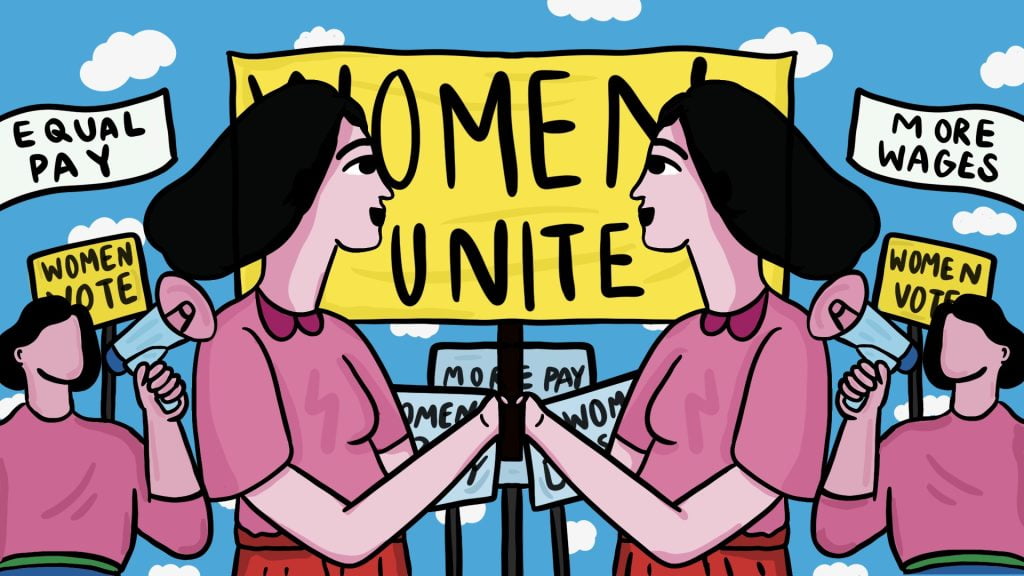The concerns encompassing women’s work at workplaces seem to hover around issues about equal opportunities, respect, safety, work-life balance, mental health, rest and the like. It is curious how these issues, despite constantly being brought to the table while framing or refurbishing company policies, continue to languish in the company to-do lists, deferred forever. Women, while equipping themselves for workforce participation, must also keep in view what might not work for them. Motivation lacked by companies to implement policies in favour of improving working conditions for women seems to be mirroring social and cultural attitudes towards women which are hard to change.
Yet, in this gloom that shrouds women’s work possibilities and conditions as women move towards more precarious, temporary jobs following the consistent apathy towards implementing women-favoured policies into action. Deloitte’s 2024 Women @ Work: A Global Outlook survey flashes hope, hope that emerges from those who move out from policy papers to policy implementation. The survey reports that women working in organisations leading in gender equality are more productive and more loyal. Two significant aspects underlie this inference- organisations implementing gender equality in action exist in reality, and women working in such improved working conditions can be instrumental for the growth of the organisations which is contrary to the belief that benefits given to women would lead to misuse of freedom and opportunities.
Deloitte’s 2024 Women @ Work
Providing a unique insight into the experiences of women in the workplace vis-à-vis women’s views on other aspects of life which often impact their experiences at work, like rights, mental health, household responsibilities, Deloitte’s 2024 Women @ Work: A Global Outlook survey looks into certain very significant issues that are increasingly becoming important for global work culture. Although gender equality has always been at the forefront of women’s movements across the world, the survey report states that only one among ten women believe that their employer is making efforts towards creating gender equable work ambience while only a quarter see a gender-diverse leadership team at their workplace.

In the face of such dismal statistics, the report tends to highlight matters that speak of small but significant progress as is reflected in the organisations marked as Gender Equality Leaders. While only 6 per cent of women participating in Deloitte’s survey work for such organisations, the report states that the proportion of women working with Gender Equality Leaders has risen slightly from 4 per cent and 5 per cent in 2021 and 2023 respectively to 6 per cent in 2024 while the proportion of women working with Gender Equality Lagging organisations has fallen slightly from 24 per cent to 21 per cent. Delving into the work experience of these 6 per cent women, the report states that not only do such women feel safer in their workplaces but they can also manage their mental health conditions well. Such women are seen to experience lower stress levels and also take less time off for mental health challenges.
Consequently, they are more motivated towards work, exhibit higher levels of loyalty and also higher productivity. Such work ambiences also foster optimism about career growth, reduce insecurities and allow women to work in respectable conditions that abstain from attitudinal abuse like de-motivating gestures or comments towards women by senior male colleagues. They are less likely to experience non-inclusive behaviour which allows them to stay longer with their employers while also intending to progress to a senior leadership position in their organisation.
For such organisations the quality of work matters rather than the hours of work which, thus, allows flexible working conditions while vesting the responsibility of work solely on the employee who tends to become more accountable for the work. Moreover, these women are also more likely to recommend their organisation to other women, thereby increasing the scope and opportunity of good work for women. The inclusive cultures practised within these organisations create respect for the work/life balance of their employees, which enhances the potential of women working with these organisations.
Reality or a dream?
Given the reality of the working conditions of most women across the world, especially in India, what the report states about the mere 6 per cent of working women seems unbelievable, at the most, surreal. There is every possibility that the findings of the report may be dismissed as ideal conditions which cannot be implemented due to infrastructural constraints. As excuses to not implement the proper working conditions continue to overwhelm intentions to do the needful, organisations remain complacent about the dismal working conditions they provide their employees with, especially to the vulnerable section- the contractual, casual, temporary women workers in the government sectors and a large number of women working in the private and non-government sectors- whose rights and benefits are dependent on the autonomy of the organisation, instead of being part of a larger policy framework.

Mental health issues, which arise due to long working hours, unmindful changes in policies and work systems, unclear expectations from hybrid work culture following Covid, workplace politics and hegemony, continue to impact the work of both men and women, more so of women who must endure almost similar situations back home. Akin to family spaces, organisational spaces are far from normalising conversations around women’s health and conveniently turn a blind eye towards it, quite often endorsing their unsympathetic, inhumanitarian and unprofessional attitudes using precepts of feminist cultures that speak of equality. While workspaces need to suspend their problematic understanding of feminism, the organisations should foster a culture where women can feel more comfortable in opening up about their experiences and also receive proper assistance towards the issues raised.
While employers must create opportunities for parental leave and emergency child care options for women to support the work-life balance that is mostly faced by them, they must also have dedicated policies that would allow them to return to the office after gaps or breaks, generating proper ambience for them to prosper and move ahead. Measures to confront sexual harassment in the workplace should not be lackadaisical but need to be strengthened. While the employee is responsible for the prosperity of the organisation, the organisations also share equal responsibility to foster the potential of the employees by creating avenues for the employees to succeed and progress. It is about creating a co-dependent ambience where proper implementation of humanitarian policies will ensure growth opportunities for all.
A way forward
Identifying Gender Equality Leaders, the report emerges as a beacon of hope which shows that such organisations are possible. The Chief Happiness Officer (yes! such positions actually exist!) at Deloitte India, Saraswati Kasturirangan significantly points out that when policies targeting the growth of women’s careers translate into action, organisations will have better prospects to grow since these would be getting the best perspectives and a driven, gender-diverse workforce while nurturing a nourishing and safe workplace. Such a situation is impossible until the male counterparts become better allies both at home and at work. It is crucial to understand that the challenges women face in a societal structure that does not favour their growth outside the acceptable parameters, the condition of female workers continues to worsen.

With childcare responsibilities, domestic tasks, and caring for adults- the home tends to emerge as a war front where the woman is permanently dodging bullets in the trenches. The domestic load continuously impacts women’s health since they are left with little or no time for rest or self-care. In addition to this, when employees they smart under office office-issued mandates, it severely affects their productivity, often pushing them to take up less challenging work, which in turn affects their growth curve.
Government-sponsored schemes like Kanyashree, and Rupashree, and awareness propagated by government campaigns like Beti Bachao, and Beti Padhao, have witnessed positive growth in the overall scenario of women’s education. These schemes have been instrumental in restricting dropout rates at school levels, thereby encouraging women to pursue higher education. Hence, a significant number of employable women are getting ready for the job market everywhere, while public sectors are continuously witnessing a contraction in jobs. As such, unprivileged women are forced to become victims of vulnerable employment, exploitative and low-paying jobs, overwork, unsafe work conditions, sexual harassment and the like.
Thus, women rank among the first to ‘sacrifice’ work for the family while also constituting a large portion of those who stop searching for jobs after repeated unsuccessful attempts. Hence not an overload of schemes that sound progressive, the need of the hour is to urge the movement from paper to performance, from policy to action which can alone create some tangible change in the work spaces for women.
Organisations need to reorganise their stand, rethink their prejudices, and rework their sense of responsibility so that instead of fostering slavish policies at workplaces for those who are already vulnerable, they may propagate an ambience of safety and respect that can be beneficial for both the employees and the employer. Women’s empowerment would, until then, remain an unfinished project, deferring their progress in all aspects of social and cultural lives.
About the author(s)
Priyanka Chatterjee is a mother, researcher, and academic. She lives and writes from Siliguri. Her articles have appeared in Feminism in India, LiveWire, Himal Southasian, Sikkim Express, among others. She can be reached at site.surferpc@gmail.com and is on Instagram @priz_chatt





